![]()
![]()
The newly appointed education adviser has my sympathy. He had spoken the truth. With scandals emerging about departing advisers, and accusations flying about the gross incompetence of the ‘PhD’ government, he must have felt the need to demonstrate the character of the cabinet.
Having lost the Candy Man, we now have an adviser who is candid in his remarks. “Regardless of the verdict of the court, the teachers shall be freed, ” he had said. Great news for the teachers. Sad news for justice.
But the candor of the education advisor is unlikely to inspire confidence in the government. He might equally have said, “regardless of the verdict of the court, we shall find Sheikh Hasina and Khaleda Zia guilty,” or any other convenient outcome for the many flimsy cases against politicians, business people, students or any other member of the public. The fact that the government finds the judicial system irrelevant, while confirming people’s fears, does do away with their flicker of hope for justice. This was a lamp that needed to stay lit.
The anniversary party could have done without the media gatecrashers. The weeks leading up to the 11th January 2008, have been particularly difficult for the government. In August, it had taken violent protest by the students for the military presence in campus to be removed, but it is the fallout of the government’s heavy-handed response that they now need to deal with. Having closed the 24 hour news channel CSB
 24 hour CSB News TV channel after its closure. Dhaka. Bangladesh. ? Kakoli Prodhan
24 hour CSB News TV channel after its closure. Dhaka. Bangladesh. ? Kakoli Prodhan
and intimidated others with barely veiled threats, they had expected an easy ride. But they had reckoned without the spunk of Bangladeshi media. BTV has long since become irrelevant. Cheek in jowl, private channel media activists have found creative ways to get the news to the public, and an informed audience has responded. I remember the phone calls ‘from above’ that came in while a talk show was going on. The savvy presenter responding smartly toned down his own questions, letting me speak as I pleased. It was a live show, and he could hardly have been blamed for the words I was using. The phone calls to the editor, the ‘invitations to tea,’ and the physical presence of army personnel have made honest reporting a harrowing task, but the news programmes are alive and well, and while they have economic pressures, they retain a loyal following.
Even newspapers that had decided to ride in the comfort of the military train are having to make face-saving critiques of a government facing derailment. It is the government, which is on the back foot. CSB is still closed, but the phone in callers, the letter writers, the bloggers and the talk show speakers have joined in the fray. This is media at its best.
Amnesty’s Secretary General, Irene Khan, made up for her initial failure to denounce emergency rule, “Amnesty believes that the government can waive some of the restrictions, even under emergency rule.” The media again had set the tone. She was far more forthright in the latter stage of her visit and pointed to the ubiquitous presence of the military in all public spheres, clearly stating that military rule was unacceptable.
I could smell the stench of decomposed flesh as I walked up the stairway of the partially demolished Rangs Building.
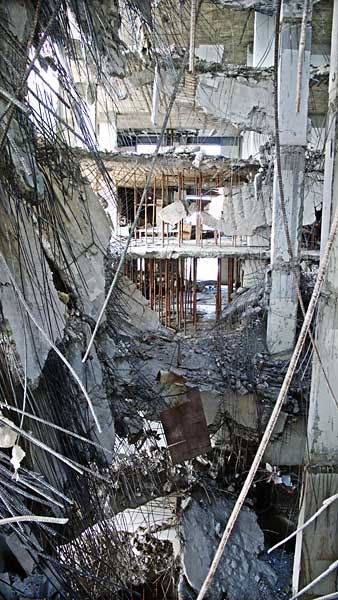
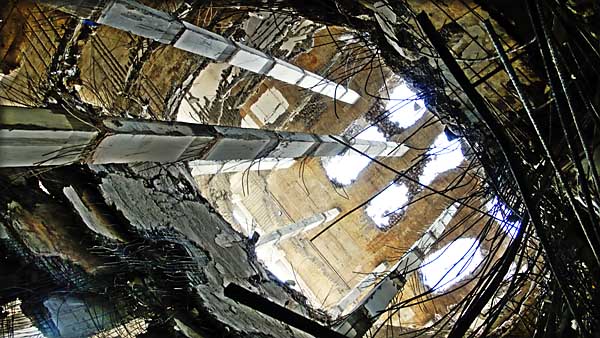
Loose concrete slabs and boulders still dangle precariously from the remaining metal rods of the Rangs Building. ? Shahidul Alam/Drik/Majority World
 Even in this unsafe condition, and while the body of a security guard is still buried under the rubble, workers remove rubble from the partially demolished Rangs Building. ? Shahidul Alam/Drik/Majority World
Even in this unsafe condition, and while the body of a security guard is still buried under the rubble, workers remove rubble from the partially demolished Rangs Building. ? Shahidul Alam/Drik/Majority World
The Rajuk administrators were themselves scared to be there, but being government officials they had little choice. They pointed me to a staircase that was relatively safe. Workers, not having my benefit of class, climbed the more dangerous ones. I wonder how it feels to walk past a deceased colleague, past the stench, the rubble, past rickety columns. What is it like to know one’s death will only matter to one’s nearest ones.
Yesterday police turned their batons on garment workers demanding outstanding wages and fires yet again engulfed city slums.
 Fire in Rayer Bazaar slum destroyed around 2500 homes. January 12 2008. ? Munir uz Zaman/DrikNews
Fire in Rayer Bazaar slum destroyed around 2500 homes. January 12 2008. ? Munir uz Zaman/DrikNews
 Garment worker killed by collapse of factor building. ? Shehabuddin/Drik/Majority World
Garment worker killed by collapse of factor building. ? Shehabuddin/Drik/Majority World
The recent deaths of other garment workers and general demands to receive an acceptable minimum wage, all point to the disengagement from the public of a caretaker government that has failed to care.
We are in need of honest answers, and while the new education adviser revealed the government’s complete disregard for the judiciary, I suspect his honesty was the unintended byproduct of yet another exercise in spin. If on the other hand, his admission of the irrelevance of the judiciary was the beginning of a process of transparency, unpleasant though the truth might be, I welcome it. Admission of guilt does not in itself solve the problem, but it does begin to address it. Something they have so far singularly failed to do. They have blamed the ills of the nation on politicians and political parties. On bad democracy. The people are in no illusion about the improprieties of the past. But bad democracy can only be replaced by good democracy. There is no such thing as good autocracy, and pliant front men, no matter who they are backed by, can never be an answer.
Tag: media
Freedom of Expression Roundtable
Amnesty International launches Bangla website and discusses freedom of expression in Bangladesh
8 January 2008
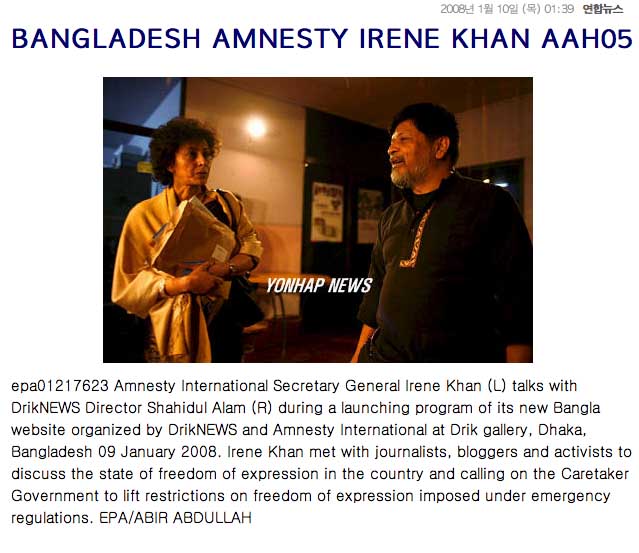 Feature on Korean media
Feature on Korean media
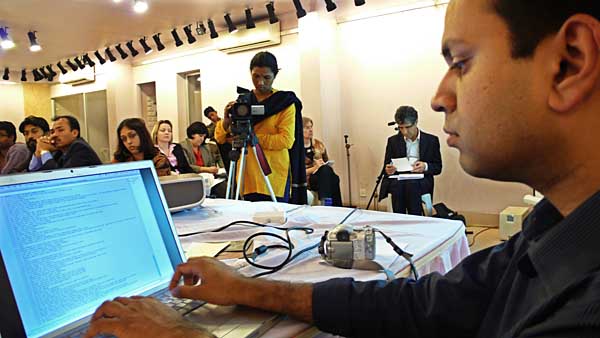 Asif Salef of Drishtipat, uploading the live text stream (text provided below). ? Shahidul Alam/Drik/Majority World
Asif Salef of Drishtipat, uploading the live text stream (text provided below). ? Shahidul Alam/Drik/Majority World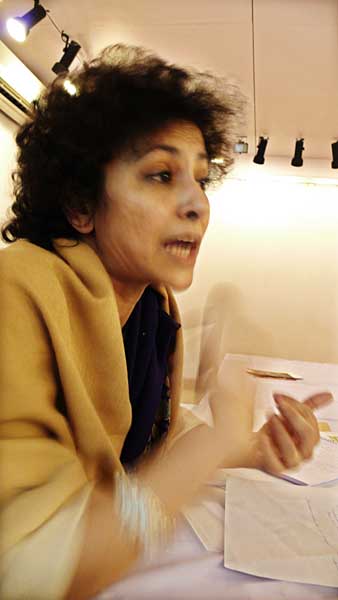 Irene Khan, secretary general of Amnesty International speaking at the “Freedom of Expression” roundtable at Drik. ? Shahidul Alam/Drik/Majority World
Irene Khan, secretary general of Amnesty International speaking at the “Freedom of Expression” roundtable at Drik. ? Shahidul Alam/Drik/Majority World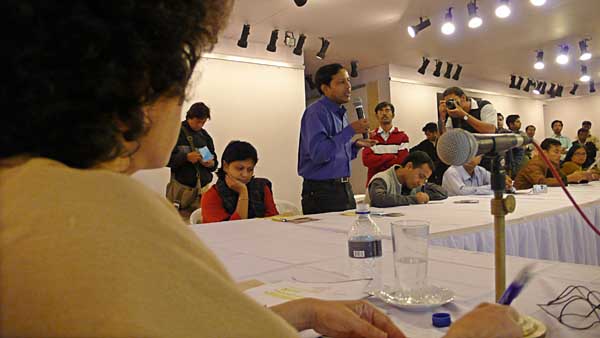 Journalist Jahangir Alam Akash talking of being tortured by military while pursuing an investigation. ? Shahidul Alam/Drik/Majority World. In an email Jahangir informs us: yesterday night, police went my previous house of uposhahor in rajshahi for arrest me, when i attend in a roundtable in dhaka in presence of amnesty international secretary general irene khan.
Journalist Jahangir Alam Akash talking of being tortured by military while pursuing an investigation. ? Shahidul Alam/Drik/Majority World. In an email Jahangir informs us: yesterday night, police went my previous house of uposhahor in rajshahi for arrest me, when i attend in a roundtable in dhaka in presence of amnesty international secretary general irene khan.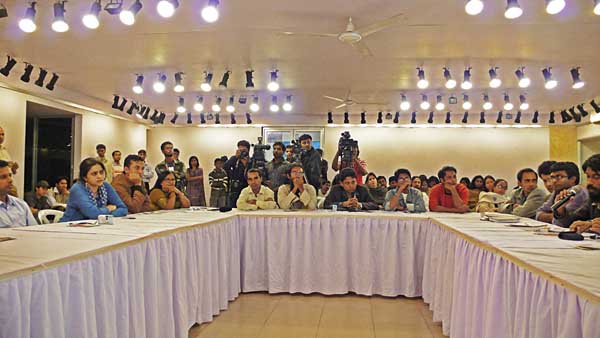 Participants at “Freedom of Expression” roundtable at Drik on 9th January 2007. ? Shahidul Alam/Drik/Majority World
Participants at “Freedom of Expression” roundtable at Drik on 9th January 2007. ? Shahidul Alam/Drik/Majority World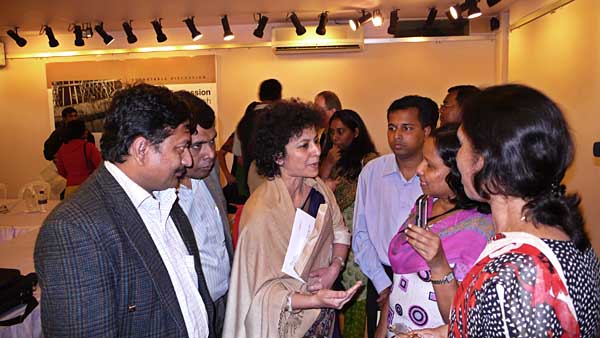 Irene Khan, secretary general of Amnesty International speaking to participants at the “Freedom of Expression” roundtable at Drik. ? Shahidul Alam/Drik/Majority World
Irene Khan, secretary general of Amnesty International speaking to participants at the “Freedom of Expression” roundtable at Drik. ? Shahidul Alam/Drik/Majority WorldTranscription by Asif Saleh/Drishtipat
Thanks to the technical team who helped set this up.
=========
greetings
the secretary general of amnesty international irene khan is with us
Shahidul Alam introducing
Irene Khan is not only a Bangladeshi but also first muslim woman head of Amnesty
We will have this show in a different format than usual
This will be a discussion and not room for speech
We want to create dialogue
Shahidul thanking all.
Irene introducing speech with a history of Amnesty
Irene talking…when I am in bangladesh from higher level it seems there is a lively media
But there must be another story
I met the army chief today and expressed my views about freedom of expression
For years now we have picked up a steady stream of journalists who have been attacked and wounded
In times of change we desperately need room for freedom of expression.
I am going to try get a complete picture from every one.
Shahidul now saying we are going to try to keep the discussion small
My name is Akash
I used to work for CSB new
The roundtable is very important for me
I want to get a little bit of time for myself.
because my rights have been severely hampered
Akash describing the story of how his rights were violated
I reported a story in CSB news when a father was shot by RAB infront of his daughter and I got persecuted for this.
Akash describing the process in details….how he has been fleeing for 3 months
he has been living a crippled life for the past 3 months
The oppression that happened to me
Akash has broken down in tears
Describing the judicial process.
Even though the high court has given him bail but still the local court still has issued a warrant against me.
There may be a lot more Akashes out there
Jahirul Huq Tito , Manik Saha to name a few over the years.
I want to live a free life
I want to go back to my profession.
and work for humanity
I want to dream of a new Bangladesh…I don’t want the oppression that has happened against me to happen to any body else,
Irene is speaking
We knew about your case
When you were in detention, I explained your case very forcefully to the foreign adviser.
You said that you do not want justice but just want to live and that shows the desperation of the case.
I want to assure you that Amnesty will do every thing they can.
parvin Sultana asks whether irene feels that we have press freedom in Bangladesh
sanjib drong of adivasi forum speaks..
Describes the case of Cholesh Richil..who was killed on March in Modhupur.
by the joint forces
The killing on the indigenous community is always justified.
I want to request you to take up the case of cholesh richil and follow through.
The perpetrators know that if indignous leaders are killed then nothing happens and that is only going to encourage more killing
I would like Amnesty to find out at what stage the investigation reports are held
Irene speaks.
Irene: We have already picked up the case and already spoke to high level cases.
High level admins
There has been no prosecution on the case
A crime has been committed but no justice has been serveed.
Pavel partha speaks
I want to highlight the violence of the multinational companies.
Companies like Monsanto ..
Our natural resouces are being stolen,
cases like Phulbari is an example of what multinationals can do in the name of progress
Corporations are violating our rights
we want to know what Amnesty can do to highlight this…
Faruq Wasif of Prothom Alo speaks
thank you irene..
Your coming to Bangladesh and solving individual cases are not the solution
we want to highlight the case of 1971….Amnesty was silent during the war of 71
Similarly your stand in this visit was very mild.
Doesn’t it show a very tolerant view of Amnesty towards military regimes?
Omi Rahman Pial speaks from bdnews24…
I am a blogger
What is the limit of my work?
I see Akash in front of me and I fear what may happen to me and what I need to do so that it doesn’t happen to me?
We have lots of irregularities and working under lots of pressure…
I can’t publish news at the right time because our internet will be brought down , calls will be made etc.
Jornalist from Samakal
We are living in an era of depression rather than free expression
I want to hear from Irene — how is she explaining Bangladesh’s current state.
I want to understand the total role of Amnesty in current Bangladeshi situation.
Anisur Rahman from New Age speaks
Cholesh is from my village
Cholesh was a symbol of free expression as well.
Cholesh used to speak for others in the community.
That’s why Cholesh was targetted
They tried not to kill the person Chalesh but silence a whole community.
Garments workers are not getting their salaries but when they are protesting, they are being taken to court.
Also want to highlight the case of tasneem khalil
We don’t know where he is today,
He was a blogger and a journalist at Daily Star.
We are seeing freedom of expression only for a few folks in certain commissions of the government.
He is now talking about some inconsistencies on tax loop holes
not sure..why 🙂
those who are on the web…this is not alam…but asif.
Shahidul asks to keep things shorts
Biplab Rahman , a blogger and journalist speaks
highlights internet monitoring.
telephone tapping
I have done a lot of research on Chittagong Hill tracks
and I want to highlight why mobile network is not there is those 3 disrticts
Therer were towers placed by the telecom companies but it was taken down by the local armed forces
I wanted to highlight the cases of university teachers as well…and think they should be released
Tipu Sultan from Prothom Alo speaks.
The journalists outside Dhaka lives under severe restriction
All the news are screened by authorities
They can not send the news of fertiliser crisis because of joint forces restrictions
They regularly face the threat of extortion cases from the local forces
But the authorities in Dhaka know this but they still deny it.
BUt the Dhaka journalists are doing much better compared to them.
Yesterday there was a case like that in Thaurgaon.
Udisa Islam speaks
Freelancer ..used to be in tv
Another introduction of mine is — I am the wife a teacher who were detained in Rajshahi University,
I am hearing a lot of sad stories..
but what is the worth of presenting this here?
We need to share this stories with each other ALL the time
This I am saying as a grassroots journalist,.
Last Aug 22nd whatever happened in bangladesh, everyone knows
Similarly whatever happenned with the museum statues.
The media played a brave role there.
How were those published and not some other stories?
Journalists oppression goes on for years!!
Its not because of state of emergency
Tipu Sultan (another victim) was not created under State of emergency (SOE)
it will happen again and again.
We need to talk about the whys of that..
Are we going to talk about the 20 students that still in prison from the university crisis?
Hana Shams Ahmed of Daily Star speaks
I want to highlight the kind of censorship after 1/11
We are very demoralised
speacially after the arifur Rahman incident.
We are very demoralised…and we can talk any thing about religion or army,
priscila raj speaks
Want to highlight three things….
Extra judicial killings
How can we work with International orgs to stop creatiion of organizations like RAB
In cases of State of emergency the most suffered are the people who are the most vulnerable in the society ..like the adibashies (indigenious community)
Lastly why do we never see the results of enquiry reports of the investivative commissions
Zaid Islam a photo journalist speaks
Sara Hossain speaks
I am here as a lawyer who represented some of these journalists who were victims in the last few years.
We need to talk about what we can do to stop this.
We always complain about internation conspiracy but we need to work in our own houses as well.
We don;t coordinate our work,.
I highlight time to the stories about slum dwellers and I send the reports to you journalists but no journalists show any interest..
But that is not the case if the story is about a big politician’s bail.
Amirul Rajib, a photo journalist speaks,
When a big crisis happens and media highlights the issue a lot but not many people are found to help them.
other than the family
We don’t have a infrastructure…
to handle these cases.
we all have to have our own personal network…
How can Amnesty help in all these cases to build an infrastructure.
to handle cases of oppression,
and also cases of regular engagement with the grassroots is needed from int orgs.
Anis highlights that no local journalist in Modhupur highlighted Cholesh’s case because they knew that that they will not survive if they highlighted that.
Ataur Rahman of journalists forum thanks to portray the current picture of bangladesh media today.
Amnesty needs to have a presence in Bangladesh.
I want to blame Amnesty for today’s crisis somewhat.
they need to have a presence in Bangladesh.
We have to look at what is happening in South Asia as a whole as well.
Amnesty needs to play a much stronger role.
here
Another question speaking about how unfairly he was sacked from Amnesty Bangladesh 5 years ago.
Najma Chowdhury from Shwadesh Khabor Weekly…
Do you think anything will change after your visit, Irene Khan?
Chandan Shaha from a weekly,,,
He highlights a case where a minister was sacked because of taking a bribe from a multinational
and wonders why the minister got sacked and nothing happened to the multinational.
Irrelevant talk about corruption of govt
Does Amnesty have a way to research these stories? Shouldn’t they already know these things?
Someone from Manusher jonno speaks
tallks about child rights in Bangladesh
what to do for children prisoner?
Shafiqul Huq Mithu speaks about jahirul Huq Tito in Pirojpur.
another journalist who has been taken in to jail by the admin.
Highlighting details of Tito’s ordeal with the court and but law enforcement agency.
Shahidul speaks,
Highlighting the permission that he had to take for the event..
at World press freedom day.
which says that there you can not criticise the govt in such cases.
We are violating law here by criticizing the govt…Shahidul mockingly reminds Irene,
You all highlighted a lot of cases here..
As journalist you tend to be in the present.
But the activists have to take a longer term perspective..otherwise it gets very depressing…
You all talked about today…but we need to talk about the past as well.
When you take a long term view of human rights, there is not a supported political system where human rights are violated…
go back from 1971…there is a thread of impunity where human rights violations have been left unquestioned
National Human Rights Commission is something that can be very powerful
Whether it is going to be a watchdog or a lapdog, it will all depend on how much pressure we ALL can create
A lot of people told me that this year extra judicial killiing have been reduced…but I am not satisfied by such replies.
We need to highlight why they are going on and what is being done to stop it.
ON freedom of expression..
Irene asking why all the draconian rules are necessary under state of emergency..
These rules are hanging like an axe?
for people..
One think that that has struck me after talking to a lot of people…
civil society and govt have understood clearly how they can use international laws and international civil society to protect the human rights in Bangladesh.
One thing to highlight is there is a worldwide network of human rights defenders.
Today’s event is being captured by people worldwide and that says a lot.
about this network,
We have an enormous opportunity in the internet to create a worldwide network..
that is why Amnesty is starting a Bangla Human Rights Portal for everyone.
I hope you all will take part in it and create a network.
What I am saying is not going to solve the problems.
But if we all create a noise together and work for change, change will happen.
We All need to work together.
on this.
We are hoping we will be able to make our website more interactive.
http://www.amnesty.org/bangla
Irene talking about the question on economic and social rights.
and explaining the campaign on human dignity which focuses on poverty.
what is relationship with human rights and climate change , poverty etc …
This is just a partial transcript of the whole conversation that took place.
Faruk Wasif and Irene are having an exchange over whether West has monopoly on human rights
We are closing …
thank you all
Shahidul thanking,,,Naeem, Givan, Asif for organizing this and highlighting the collaboration of a lot of people.
Shahidul ends with saying that the movement is ours whether or not Irene Khan is there or not,
From Dili to Delhi
![]()
I had just left behind a tense East Timor. No rice for several weeks? violence had again erupted on the streets. I had expected my one day pit stop in Dhaka, on my way to a UNAIDS assignment in India, to have been less eventful. Dili to Delhi had a nice ring to it. The plane had arrived in the early hours of the morning, and as I sat at Drik trying to finish the million pending bits that invariably pile up, Rahnuma rang to talk of the fire. Soon we were up there, outside the familiar building where I?d recently given interviews. Through the billowing smoke, my NTV and RTV mugs reminded me of how close our lives constantly were to needless tragedies shaped by irresponsible gatekeepers. I wondered whether the new gatekeepers in power, ushered in by an unspoken coup, would be different. They had started well, arresting corrupt individuals, and attempting to establish the rule of law, but the sinister rumblings of indefinite stay, had all the signals of previous regimes while the significant omissions in their ?hit list? was deeply worrying. On the plane Farhad Mazhar and I talked of having to brace ourselves for new measures designed to make us more safe. As for the disproportionate influence of ?friendly nations?, swapping freedom for security appeared to be the order of the day. I wish we had a choice on whom to befriend.
Naeem?s translation of Anisul Haque?s moving Op Ed, and Peu?s mail pointing to Munir?s powerful images,
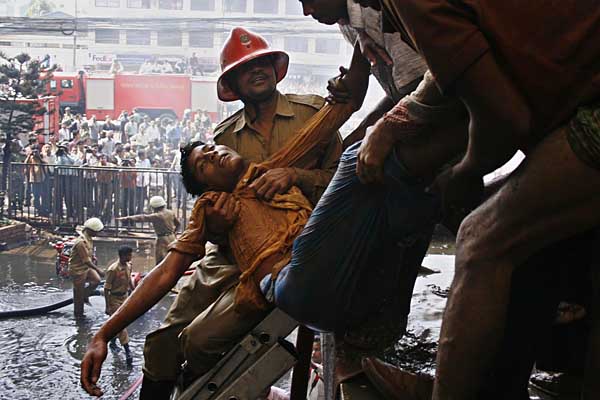
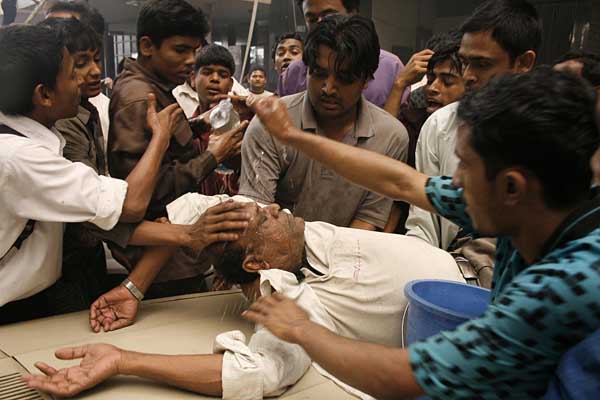
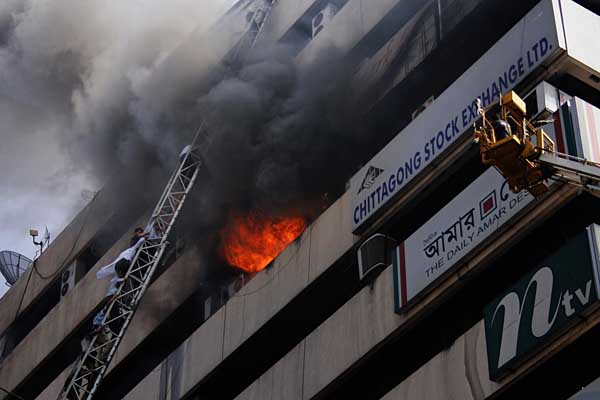
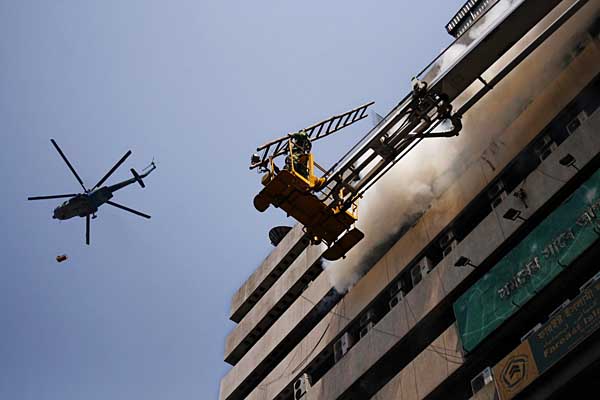
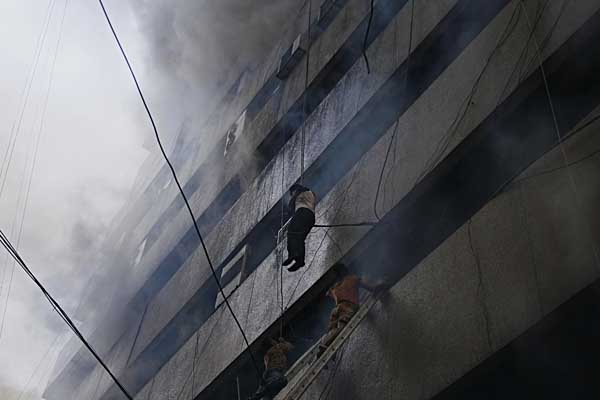
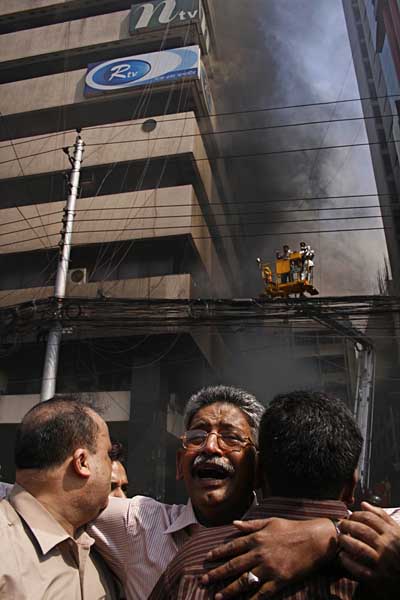 Photographs copyright Munir uz Zaman/Driknews. (Permission for use and high resolution images available from www.driknews.com).
Photographs copyright Munir uz Zaman/Driknews. (Permission for use and high resolution images available from www.driknews.com).
bring home a message too often forgotten. As Shupon points out, we forget very easily. As we?ve forgotten the deaths in the garment factories, or the ferry disasters. But then, those had involved the death of poor people.
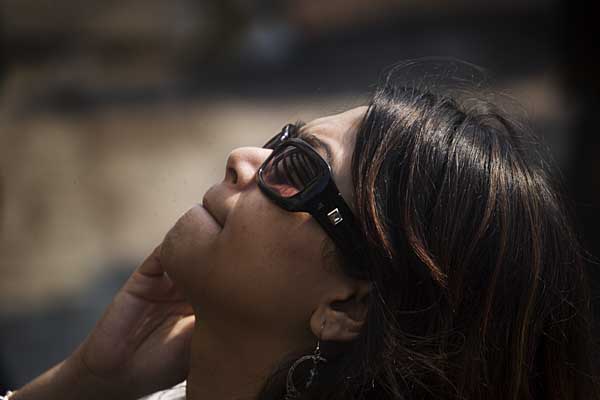 copyright: Shahidul Alam/Drik
copyright: Shahidul Alam/Drik
The near death of the well to do could perhaps have a more lasting memory.
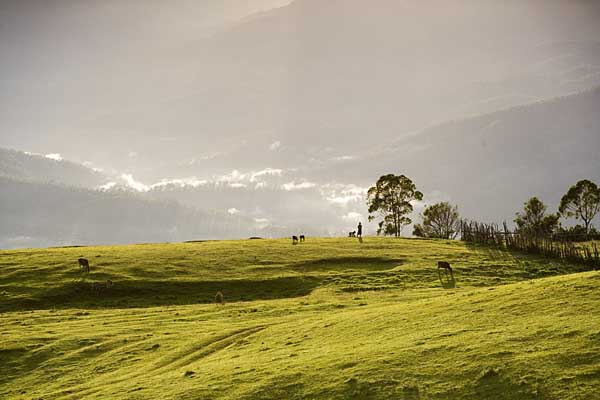 copyright: Shahidul Alam/Drik
copyright: Shahidul Alam/Drik
The tranquil mornings in the mountains of East Timor seemed a long way away.
Shahidul Alam
Delhi
27th February 2007
Boundaries
Chobi Mela IV
She packed her load of firewood onto the crowded train in Pangsha. The morning sun peered through the lazy winter haze. The vendors called ?chai garam, boildeem? and the train slowly chugged out of the station, people still clambering on board, or finishing last minute transactions. Some saying farewell. The scene had probably not been very different a hundred years ago. Maybe then, they carried pan in place of firewood, or some other commodity that people at the other end needed. She would come back the same day, bringing back what was needed here. Only today she was a smuggler. The artificial and somewhat random lines drawn by a British lawyer had made her an outlaw. She was crossing boundaries. There were other boundaries to cross. The job a woman was allowed to do, the class signs on the coaches that she could not read but was constantly made aware of. The changing light and the smells as sheet (winter) went into boshonto (spring). The Ashar clouds that the photographers waited for, which seemed to wait until the light was right.
Rickshaw wallas find circuitous routes to take passengers across the VIP road. Their tenuous existence made more difficult by the fact that permits are difficult to get, and the bribes now higher. Hip hop music in trendy discos in Gulshan and Banani with unwritten but clearly defined dress codes make space for the yuppie elite of Dhaka. The Baul Mela in Kushtia draws a somewhat different crowd. Ecstasy and Ganja breaks down some barriers while music creates the bonding. Lalon talks of other boundaries, of body and soul, the bird and the cage.
Photography creates its own compartments. The photojournalist, the fine artist, the well paid celebrity, the bohemian dreamer, the purist, the pragmatist, the classical, the hypermodern, the uncropped image, the setup shot, the Gettys and the Driks. The majority world. The South. The North. The West. The developing world. Red filters, green filters, high pass filters, layers, masks, feathered edges. No photoshop, yes photoshop. Canonites, Nikonites, Leicaphytes, digital, analogue.
The digital divide. The haves, the have nots. Vegetarians, vegans, carnivores. Heterosexuals, metrosexuals, transsexuals, homosexuals. The straight, the kinky. The visionaries, the mercenaries, the crude the erudite, the pensive the flamboyant. Oil, gas, bombs, immigration officials. WTO, subsidies, sperm banks, kings, tyrants, presidents, prime ministers, revolutionaries, terrorists, anarchists, activists, pacifists, the weak, the meek, the strong, the bully. The good the evil. The hawks the doves. The evolutionists, the creationists. The crusaders the Jihadis. The raised fist, the clasped palms. The defiant, the oppressive, the green, the red. The virgin.
Whether cattle are well fed, or children go hungry, whether bombs are valid for defence, or tools of aggression, boundaries ? seen and unseen ? define our modes of conduct, our freedoms, our values, our very ability to recognise the presence of the boundaries that bind us.
Festival Website
The Land Became The Sea
Subscribe to ShahidulNews
As we watch in horror at the scale of the event, several things come to mind. How events a thousand miles away can affect our lives in so many ways. How connected we are in our joys and our sorrow. I realise that Bangladesh was not as badly affected as our neighbours, and that we should take pride in our achievements, but Bangladeshi newspapers today gloated over the victory of the Bangladeshi cricket team over India in their headlines! While I fret over the fact that the media plays on the negative, to downplay a disaster of such proportions in favour of a cricket match said a lot about our sense of proportions. In 1991, when nearly a million people had gathered to demand the trial of a war criminal, the government had chosen to ignore the news and mentioned instead the man of the match in a cricket game in Shunamganj. I had hoped a free media would play a more responsible role.
As I watch BBC and CNN interview British and German tourists, and the director of Oxfam from her office in Oxford, I remember my experiences in the 1991 cyclone where one hundred and twenty thousand people died in Bangladesh. As I stumbled through the debris, trying to get a sense of what had happened on the night of the 29th April 2001, I kept asking “What happened that night?” The aid workers told me of the number of bags of wheat they had distributed. The government officials quoted the figure in dollars that would be needed for reconstruction, the engineers spoke of the force of the wind.
A young woman in Sandweep looked at me and said “The land became a sea, and the sea became a wave”.
I try to imagine the tsunamis hitting the coasts of India, and Sri Lanka and Indonesia, and remember her words. The thousands whose lives have been wrecked by the earthquake do not constitute the ‘experts’ that the media consider worth asking.
Shahidul Alam
27th December 2004
Dhaka
Chobi Mela III Ends
Subscribe to ShahidulNews
![]()
Well, Chobi Mela III is coming to an end. One of the artists visiting Chobi Mela III was the celebrated Mexican photographer, Pedro Meyer. Pedro is also the editor of one of the most popular websites on photography <
Bangladesh is according to economists, one of the poorest countries in the world. However, statistics tend to also obscure other aspects of life that seem to get lost in such descriptions as “among the poorest in the world”. I found that the people in Bangladesh are among the friendliest I have ever met any place, nothing to say that they must be the biggest enthusiast of having their picture taken that exists on the face of this earth. Probably the most efficient way of getting on with life is, how it is dealt with, in this very poor nation.
This event (Chobi Mela) here, is one of the largest of it’s kind in Asia. Bringing photographers and their work to the forefront during the two weeks of this festival. I have met photographers from all over the region, and I am sure that as this festival grows over the coming years, Bangladesh will increasingly become a major center for the development of photography. And what better place to have such an event than a city, where to such a large extent, photography is welcomed by the population.
Pedro Meyer left day before yesterday, Raghu Rai left yesterday, Ozcan Yurdalan left this morning, while Zhuang Wubin is still out there somewhere in Sylhet. The exhibitions by Morten Krogvold, Michel Szulc-Krzyzanowski, Srinivas Kuruganti (Alliance Fran?aise), John Lambrichts (Goethe Insitut), Raghu Rai (Drik Gallery One), Darren Soh, Student?s of Morten?s workshop, Zhuang Wubin and Chris Yap (Drik Rooftop Gallery) all end today. We will arrange separate showings for ?Bridging East and West?, by Saudi Aramco World, which was held up by customs, and the exhibition by students of Barbara Stauss at a later date. Those of you who cannot make it to the galleries should give your eyes a feast at <http://www.chobimela.org/> www.chobimela.org.
Shahidul Alam
Identity Card
Subscribe to ShahidulNews
The mail today brought a copy of ?Amader Kotha?. A publication by the American Center in Dhaka. The lead article in this unsolicited newsletter by Abu Naser was entitled ?An International Election in November: A chance for Bangladesh to learn about democracy?. As I landed at Zia International Airport yesterday, my colleague Tanvir, told me of the gunning down of the opposition MP the day before. At night I stopped the rickshaw to photograph the burning cars in the streets. The violence, the protests, the despair, is all too familiar. We saw it during military rule and during all the subsequent regimes. Abu Naser rightly, points to failures in the democratic process in Bangladesh. But to learn about the democratic process from the US! Perhaps it had to do with Rumsfeld?s claim that their failed cover up of military atrocities was evidence of a healthy democracy. Their previous ?exemplary? election is perhaps better left unmentioned.
I remember the surprise in the media in the UK, aghast at what was being reported from Iraq. It is hardly as if this had not been known before, by anyone who might have cared to listen. I am less surprised, when the confirmed atrocities by US soldiers, is suddenly seen as something done by them out there. No talk of coalition forces this time. No talk of united responsibilities, or united blame. I am not surprised when the assassinations in Palestine resulted in merely the predictable ?condemnation? by the UN and western nations. ?Tut tut, you mustn?t do that you know!?
I see the fire raging around me and throughout the globe and remember Mahmoud Darwish?s anger.
Shahidul Alam
Dhaka. May 10th 2004
Identity Card
Write down!
I am an Arab
And my identity card number is fifty thousand
I have eight children
And the ninth will come after a summer
Will you be angry?
Write down!
I am an Arab
Employed with fellow workers at a quarry
I have eight children
I get them bread
Garments and books
from the rocks..
I do not supplicate charity at your doors
Nor do I belittle myself at the footsteps of your chamber
So will you be angry?
Write down!
I am an Arab
I have a name without a title
Patient in a country
Where people are enraged
My roots
Were entrenched before the birth of time
And before the opening of the eras
Before the pines, and the olive trees
And before the grass grew
My father.. descends from the family of the plow
Not from a privileged class
And my grandfather..was a farmer
Neither well-bred, nor well-born!
Teaches me the pride of the sun
Before teaching me how to read
And my house is like a watchman’s hut
Made of branches and cane
Are you satisfied with my status?
I have a name without a title!
Write down!
I am an Arab
You have stolen the orchards of my ancestors
And the land which I cultivated
Along with my children
And you left nothing for us
Except for these rocks..
So will the State take them
As it has been said?!
Therefore!
Write down on the top of the first page:
I do not hate poeple
Nor do I encroach
But if I become hungry
The usurper’s flesh will be my food
Beware..
Beware..
Of my hunger
And my anger!
An extract from the text of the Berlin Festival Appeal:
“Mahmoud Darwish was one of the best-loved Arab poets of modern times and counts among the most eminent poets in the history of world literature. Thousands flocked to hear his readings, and his volumes of poetry have been published in the hundreds and thousands. Numerous pieces have been translated into more than 30 different languages. His poems have been transformed into folksongs and many of his verses have taken on the character of proverbs.
Darwish‘s poetry draws inspiration from the tradition of ancient Arab poetry and Modernist influences and borrows from the style and language of both the Qur’an and the Bible. Few other poets have displayed such dedication to articulating a vision of a meaningful, real and fair peace between Arabs and Israelis, which furthers a dialogue between two voices and two different outlooks on life, while ensuring that one does not impose its view upon the other.
In the tradition of ancient Arab poetry, the poet assumes the role of spokesperson for his people. And despite Darwish‘s move away from this role since the 1990s, many readers still viewed him as Palestine’s literary ambassador to the last.
Mahmoud Darwish was born in 1941 in the village of Al-Birweh near Acre. In 1948, he fled to Lebanon and returned after the foundation of the state of Israel. He worked as an editor for various political and cultural journals in Haifa. After being imprisoned on numerous occasions, he left Israel in 1970 and went into exile. He has lived in Moscow, Cairo, Beirut, Paris and, most recently, in Amman and Ramallah. In 1987, he was elected to the executive committee of the Palestine Liberation Organization and helped draft the Palestinian Declaration of Independence in 1988. He left the organization in 1993 in protest against the signing of the Oslo Accords. He received numerous awards, including the Lannan Prize for Cultural Freedom in 2001 and the Erich Maria Remarque Peace Prize in 2003.
Darwish died on 9 August 2008 following heart surgery. He was buried in the West Bank city of Ramallah and granted a state funeral.”
—
Gallerie Publishers
208 Om Chambers
Kemps Corner
Mumbai 400036
India
————————————————————————————
Mahmoud Darwish 1942 – 2008
Mexico Revisited
Subscribe to ShahidulNews
It was in the early 90?s that Pedro had written. I had only heard of this famous Mexican photographer, a pioneer of digital photography and author of the first photo essay on CD ROM, ?I Photograph to Remember?. It was a gentle, intimate and deeply perceptive essay on the last days of his parents who were dying of cancer. I remember the image of his father looking as if he could fly. He was bringing out his new CD, ?Truths and Fiction? and wanted me to write an introductory text, something about my responses to the new digital technology. We didn?t have email then, and faxes were expensive, but we continued a dialogue that went far beyond his CD, or his subsequent books.
We met several years later when Ma, Rahnuma and I had gone to Arle, in the South of France. I had a small exhibition in the festival there. Rahnuma was doing her PhD in Brighton and Ma and I were going to join her there. We would go on to France, and Italy and then go overland through the Alps to Holland. It was before Schengen, so we needed visas for each country that we needed to cross. Armed with invitation letters from friends in each country, Ma and I did the embassy rounds. Friends at the embassies helped, and we even got recommendation letters for Rahnuma which she could use in London for her visas. Undaunted by the sign inside the Belgian Embassy in Dhaka, that said ?We do not issue tourist visas?, and other equally friendly mementos in the remaining ones, we gathered all the visas, joined up with Rahnuma in London and headed off to Paris. The organisers were paying for my trip, but Andre Raynouard at the Alliance, had kindly arranged for trips to France for photographers Shehzad and Mahmud as well and we all met up in Paris. Trips to Editing, the agency that represented us in France at that time, and visits to Magnum were warm ups to Arles. We took the train to Marseille where Gilles and Isabelle picked us up. Driving through the sunflower fields that Van Gogh and Gaughin must have painted, I remember wondering if the mottled bark of the trees in Arles had inspired their rugged brush strokes.
Pedro had a massive exhibition at Arles, and I remember marvelling at the digitally produced images printed on canvas, hanging in gilded frames, all along the walls of what appeared to be a medieval church. Pedro was showing the new CD on a Mac to his enraptured audience. I too had a go playing with this new toy. Thinking I was Hispanic, Pedro came up to me and asked if I would like to see the Spanish version. In an air of nonchalance I shrugged, but suggested I might be interested in the Bangla version. Pedro smiled and told me of this very good Bangladeshi friend that he had, called Shahidul Alam, who he would introduce me to! The bear hug that I got when I revealed my identity nearly did me in.
The rest of the trip went well too, but the highlights were, being in Milano at the house of Gabriela Calvenzi, the picture editor of MODA, when Italy beat Bulgaria in the semis of the world cup and that breathtaking train ride through the Alps. We visited Nipa and Alam in Basle, and they drove us through the sunflower fields and gentle waterfalls in Switzerland. Ma was disappointed that they did not check our German visas on the train. We had gone to so much trouble to get those visas! Walking through Amsterdam?s red light district with Ma was another interesting experience, but what I remember more of that city was the meal we had. I had been in the jury of World Press (WPP) the two previous years, and had many friends there. Marloes Krijnen, the managing director of WPP took us all to dinner at a fancy Argentinean restaurant. Ma ordered a very exotic sounding dish, which we were a bit jealous of, until the waiter turned up with a baked potato with a blob of butter on top!
The US trip to visit Rahnuma?s brother Khadem, was relatively uneventful, except for the immigration officer?s zeal in checking us out, as he always did with ?certain types of passports?. This resulted in us missing our flight, and I was in full ?journo mode?. Out came my notebook, my digital recorder, I took copious notes, interviewed people, quizzed him on what he meant by ?certain types of passport?. The guy was rattled enough to upgrade us to business class for appeasement. He tried to mumble something about our garb being inappropriate, but my cold stare put a stop to that.
We didn?t go to Mexico that trip, and my first opportunity came in 1996, when the Centro de la Imagen invited me to speak at PhotoSeptembre. As it is now, there was no Mexican embassy in Dhaka. even my foreign secretary friend had been unable to extract a visa application form from the nearest embassy in Delhi, let alone a visa itself. I tried plan B. The consul general in London had heard of me and wanted to help. We exchanged phone numbers as I went off to Fotokina in Cologne, loathe to hang around in London while the bureaucrats decided what to do with me. The consul phoned me in Cologne, asking me to take the night train, in order to arrive in time. Groggily, I made my way from Waterloo to the consul office. True to his word, the consul managed a visa in time for me to race to the airport and catch my flight to New York and on to Mexico City.
Being the only African or Asian in this huge meet with over 800 exhibitions should have been daunting, but my naivet? helped me overcome such inhibitions. I was thrilled by the work on display in this amazingly culturally rich city. Manual Alvarez Bravo turning up on the day of my talk should have been enough. Reaching across to the next table over dinner to chat to Gabriel Garcia Marquez should have left me sufficiently awed, but I was too excited to be fazed by any of this. My memories were more of the trip to Oaxaca that Patricia Mendoza, the director of Centro de la Imagen had organised for a few of us. It was a small but interesting group. Fred Baldwin and Wendy Waitriss who ran Fotofest in Houston, Alasdair Foster (this was when he ran the photo festival in Edinburgh and before he became the director of the Australian Centre of Photography), and Marcelo Brodsky, the president of Latin Stock from Sao Paolo, made up our motley team. We passionately argued, and fervently planned; charting out the routes that we felt photography should take. I remember those torrid moments, but my most distinct memory is of the midnight visit to the Aztec temples that Patricia had managed to organise. The temples were off limits after sunset, but Patricia knew everyone, and had arranged for us to go on a full moon. I remember walking along the ancient corridors of the shrine, glistening in the moonlight, the quiet and eerie stillness, the sound of the bats, the whoosh of the owl, and sparkling in the valley below the gently glowing city of Oaxaca. I have very different memories of Francesco Toledo, sitting on the red clay, chatting to other artists. This was the artist who had raised millions and donated his own work, to set up some of the finest museums and galleries to be found. I could imagine him in the dried up pond in Charukola, or in Modhu?r canteen, passionately debating the merit of some work of art. While the visions included Toledo and other students, sadly, I couldn?t see the directors or the DGs of our own institutions coming out of their dull carpeted offices with towel backed chairs and touching the earth with such sincerity.
I remembered the brightly coloured shawls, the hibiscus and tamarind drinks, the blue beans and the fried crickets. So when Pedro asked me to speak at the 10th anniversary of zonezero.com I could hardly refuse. There was still no embassy, and no guarantee that it would work again in London. The world had changed in between, and Pedro was loath to have a bearded Muslim, negotiate immigration officers in the ?land of the free?. So he arranged for a direct flight to Mexico City from Paris, and sent a very official looking letter with lots of stamps to the embassy there. I had been emailed a copy. I was going to Prague enroute, so two visas needed to be managed. Luckily Martin Hadlow of the Media Development Loan Fund in Prague who had invited me to Prague, knew the ambassador in Paris, who knew the ambassador in Bangkok, who spoke to the consul general in Kuala Lumpur. The Czech consulate gave me a multiple entry visa immediately but Mexico was not going to be so easy. I was going to buy the tickets to Prague, Amsterdam and Manchester in Paris. So I had a ticket to Mexico and no visa and a visa to the Czech Republic but no ticket. It was going to be fun.
We were all approaching Prague differently. Sameera and I travelled to London together, and I went on to Paris. Czhoton had been doing a long assignment in Denmark, so he flew directly from Copenhagen. Shabbir unfortunately had been denied a visa, for the ?Catch 22? reason that he had never been to Europe before. I was staying with Sylvie Rebbot, the picture editor of Geo. In the morning, it was Sylvie who navigated the answering machine sil vous plez?s, but ended up getting no coherent response from the embassy. So armed with a map, I walked down Strassbourg St Denis to rue de? . The embassy was closed. With my rusty French, I could work out that the 16th September was Mexico?s Independence Day. Luckily, and rather uncharacteristically, I had kept a margin and had resisted purchasing my other tickets until I had my Mexican visa.
Dominique from Contact Press recommended their travel agent who was very helpful, but struggled with my itinerary. A Paris Prague single came to over $ 1,200! A return would work out cheaper, but I needed to include a Saturday night. That meant missing out on my show in Groningen, as I wouldn?t have time to go on to Manchester and then to Oldham and back to Paris in time to catch my flight to Mexico City on Tuesday morning.
Eventually we managed a Paris, Amsterdam, Prague, Amsterdam Paris ticket that was reasonable, and good old Easyjet from the nearby cybercafe, provided a Paris Liverpool Paris flight, at a quite good price. All I now needed was that Mexican visa. The visa officer I met on the 17th was very pleasant. Pedro had provided an imposing looking document, with several stamps. The sort bureaucrats love. Gauging that they would issue the visa, I hesitantly asked how long it might take. ?48 hours? was the short reply. I was in trouble. All my budget price tickets were non refundable and non endorse-able. Besides, I?d already killed two of the four days I was meant to have for this meeting in Prague. Luckily, I had my itinerary with me. The sight of eleven flights, two train journeys and four car journeys, across ten cities in three continents over fifteen days, should have been enough to convince her that I was totally mad, and shouldn?t be allowed in any country, but it worked, and she agreed to let me have the visa in an hour (my flight to Amsterdam was in the afternoon). There was the minor matter of the fee. 134 Euros to be paid in cash. I gulped. In these days of electronic money, one rarely carried cash around. No problem. I had my travellers cheques. I would be back in a jiffy with the money. Could I have my passport please. ?Sorry, we need the passport to process the visa.? Logical enough, but I was stuck again. I combed all the banks in the neighbourhood, but they wouldn?t give me an advance on my credit card. Eventually a bureau de change with a trusting officer, decided he would take the risk, and cashed my travellers cheques without a passport. Back to the embassy, collect visa, rush to Sylvies?, train to Garu du Nord (Charles de Gaulle, doesn?t have a left luggage), pick up luggage, and finally with visas, tickets and passport, I dashed to the airport. Paris, Amsterdam, Prague, Amsterdam, Groningen, Amsterdam, Liverpool, Manchester, Oldham, Manchester, Liverpool, Paris and then on to Mexico City. In between Martin had taken us on a lovely night walk across old Prague. Drew, arranged the Liverpool, Manchester Oldham circuit, and Lotte and Anonna, joined me in Groningen, where Maria and Ype gave me a grand tour of the Norderlicht (the Northern Lights) Festival. Opening up galleries in the middle of the night, Bresson, George Rodgers, Capa, all in one go! And of course there were my two shows, in the synagogue in Groningen and the one in Gallery Oldham that I had gone to see.
Mexico was all that it had promised to be. Great speakers, old friends, wonderful presentations. Our own session was unusual. There were only two speakers as opposed to the customary four. Brian Storm, Bill Gate?s right hand man at Corbis, versus this bearded Muslim from a small agency in Bangladesh! Techno power versus spunk! It was the classic duel and the gallery loved it. I don?t think Gates will be making a takeover bid for Drik just yet. It was again at Pedro?s on the eve of the talk. Trish was leaving for New York the next day, for the judging of the Eugene Smith Awards, and this was a quick dinner she?d arranged. Mark (senior curator of Victoria and Albert Museum in London) and I were the only guests. Pedro took us for a walk along Coyocan. We went down the streets where Frieda Kahlo and Trotsky used to live. Visited Cortes? palace where Pedro and Trisha were married, and soaked in the energy of Pedro?s bustling para.
There were of course the more traditional touristy visits. I?ll remember Maximilian?s palace for its ornate loo, and the boat ride along the ?Floating Gardens of Xochimilco? and the Aztec dance amidst the pyramids. It took a while to get used to the fact that we had a film crew following us for most of the trip. The producer, Michel, had been a war photographer for many years, but was now known for his sensational environmental films. We talked of the possibility of him coming to Pathshala to teach. The highlights for me were the visit to Fototeca in Pachuca where we saw the original glass plate of Zapata?s official portrait. The joy of holding history in my hands, was only to be topped by the visit to the incredible ?Museum of Anthropology? in Mexico City. I had been told about this famous museum before, but hadn?t quite made it during my last visit. This time round I was determined to make it. North Americans, Europeans, Latin Americans and one lone Bangladeshi made a curious mix.
What a museum it was! Having visited some of the most famed museums around the world, I felt I had seen it all, but this one simply took one?s breath away. Apart from the sheer exquisite nature of the exhibits, I was enchanted by the love and the care that must have gone into setting up the display. Each piece of stone, was carefully positioned, thoughtfully lit, and displayed as a prized possession, which of course they were. The tombs descended down an intricate stairway, with sections cut out, so we could visualise our descent into the burial grounds. Lights carefully placed at floor level, lit up small artefacts, that characterised the personalities of dead. Tools for the rights of passage, a child?s toy, a garment to take one across the border of the living and the dead. The walls, the floor, the ceiling, the distant vision, each had a role to play in this wondrous display.
I had finally managed to free myself from my endearing film crew, on the morning of departure. I was not going to miss the Koudelka show. Hanging around the Palais Bella Artes, waiting for the doors to open, I made rapid notes of what was left on my ?to do? list. Gift for people back home! I was in trouble. But Koudelka was having none of this. This was an exhibition that could not be rushed. The sheer versatility of the man was amazing in itself. And then to see, in his latest reincarnation, images with such mastery of tones, such splendid play of forms, such freshness of vision, was simply mind blowing. Shopping time had to go. I needed excuses. Still reeling from this visual feast, I dashed to the alleyways at the back of the Sheraton. There were no ponchos for Topu, but a few revolutionary T shirts, and the odd Mexican trinket would have to do.
I stopped in Paris long enough to drop in at Reza?s and pick up the CD for the new Drik calendar. Sylvie had arranged an assignment for me with Geo, and having taken over the Contact Press Office, I asked the writer to visit me there. Michel Szulc Krysnovsky had just returned from his assignment in Dhaka where Pathshala student Sunny, had worked as his fixer. He brought his portfolio over, and we talked of exhibition possibilities. Robert gave a copy of his new book on the Cultural Revolution for Rahnuma and me, duly stamped with his new Chinese signature. A few hours sleep at Sylvie?s and it was time for the airport again. I would have three whole days in Dhaka before heading off to Taipei. Bliss.
When a Pineapple Rolls
Subscribe to ShahidulNews
![]()
Getting hold of a copy of the banned magazine was difficult, but most of the people who were subscribers seemed to have read the article. As often before, censorship had given the Time Magazine piece a notoriety, and readership appeal, it might not otherwise have had. The ban was short lived, and soon the article had been forgotten.
The Bangladesh government’s treatment of its journalists however had not been so short lived. The Channel 4 journalists were predictably, released well before Christmas. For Saleem Samad, and Priscilla Raj, the situation was considerably different. Tortured and terrorised, they fell victim to a government in permanent fear of being labelled `fundamentalist’. When a pineapple rolls it is the grass that suffers, and post 9/11, it is the small states that have felt the pangs of `terrrorism control’.
The ban of the 28th July 2003 Newsweek issue was based on fears at home. “Repeated bans on international magazines on account of articles on Islam constitute a flagrant violation of the free flow of information,” Reporters Without Borders said in a letter to Bangladeshi information minister Tariqul Islam.
The RSF statement fails to address the wider issue of control on the media. Arranging photo ops, planting questions at press conferences, removing access to the `pool’ for dissenters, spin, corporate control of the media and the newly found ally of embedded journalists are beyond the reach of a government with limited media management skills. Fisk, Chomsky, Pilger, Monbiot et.al. have made valiant attempts to overcome media control in the west. But neither their work, nor the excellent independent analyses that have circulated on the Net, have managed to create a significant challenge to a well-entrenched propaganda machinery. They have largely preached to the converted.
The handling of the Channel 4 incident and the ban on Newsweek by the Bangladesh government were at best clumsy. Buying out the limited copies that are imported for Dhaka’s elite, could have far better stymied the tiny readership to Time and Newsweek in Bangladesh. An “Out of Stock” label has far less glamour than a “Censored” sticker. The harassment of Samad and Raj, was unnecessary. These were ill paid professionals trying to make a living helping foreign journalists.
A flimsy majority that depends upon a small but significant Islamic party, makes things further complicated for the government of Bangladesh. Dissent within has to be managed along with keeping in the good books of powerful states. The earlier Time Magazine article on Al Qaeda links, was tenuous at best, and the Far Eastern Economic Review article on the rise of fundamentalism was shoddy journalism. But when it is so important to say one has been a good boy, any slander, no matter how unbelievable, has to be vehemently denied. Banning the award winning film Matir Moina, (now showing in cinema halls, with only minor amendments) was a knee jerk reaction, symptomatic of a nervous government trying to juggle with appeasement outside and appeasement within.
This is not the first time the Islamic parties (Islami Oikya Jote, IOJ) have played a key role in parliamentary dynamics. Popularity for major parties far exceeds the following of OIJ, a small and disciplined party. Despite their low votes however, they have had a key presence in all governments since the elections in 1991. “We could withdraw from the alliance if the demands are not met,” Mufti Fazlul Huq Amini has threatened at strategic moments, and the government does not want to rock its own boat.
While we may be thankful that the Bangladesh government is not media savvy, the more crude attempts to suppress free journalism doesn’t bode well for media professionals. We have now had three largely free and fair elections, but the elected representatives of the people have hardly behaved in a democratic manner. Each of the three governments have resorted to violent means to ensure loyalty. More recently, warrants of arrests, issued against five editors and one executive editor on defamation charges, within a period of three weeks, represents a shift in strategy. The minister’s statement “Wherever you will find journalists, break their bones,” was really intended for rookies on the streets, and rural journalists. Going for the big boys is a more recent affair.
So how does a nation, scared of big brother, and managing a rickety coalition handle the media? Letting the journalists speak appears to be the most sensible route out. Surely, not all western journalists will be as incompetent as their Times and FEER counterparts. Maybe they themselves, given a more free hand from corporate control, would exercise the journalistic rigour required of them. Strengthening local media would go a long way in providing alternative analysis to western viewpoints. Murdered journalists don’t write too well.
“Not a hair will be touched” the minister had said in 1994, when feminist writer Taslima Nasreen was facing persecution. Not a hair was touched, and Nasreen, still under threat, was provided safe exit to a land of her choosing. In the same July 1994 issue where the NYT covered this story, there was another news, of a US doctor going to work in a bullet-proof vest and being shot in the head. While one tripped over the word fundamentalism in the Nasreen article, religion or fanaticism was never mentioned in the story of the doctor’s death. When journalists regurgitate a state’s values, control is complete. Thankfully, Bangladesh has not reached such levels of state control, and our journalists have not reached such levels of acquiescence.
A responsible media which operates freely, could do wonders for Bangladesh, for its image and its people. But there is a downside to this. A more informed public would be less easily manipulated, corruption would be more difficult, absolute power would be more readily questioned. Government acquiescence in the face of western interests flies against the rhetoric of demands for free press by western states. Secret deals are more easily made in the absence of meddling journalists.
As for terrorism, we would love to see it end. If only the US would stop manufacturing it.
Shahidul Alam
Fri Aug 15, 2003
